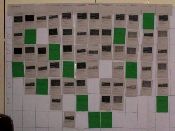|
Stage 2 of the process of testing soil and water conservation strategies in field experiments.
 |
For each field site, a detailed Site Implementation Plan was designed using the format specified in the blueprint.
This was followed by the implementation of the field experiments. Sites were chosen with the help of the stakeholders following their discussions in Research Theme 3. These are different in nature: some are comparing technologies in small catchments, some on farmer’s fields, some on a series of smaller plots.
|
In total 33 experiments were conducted in 16 countries, for a maximum of 3 years.
|
 |
With respect to desertification related processes, erosion problems were countered mostly by agronomic measures: green cover (on 2 sites), mulch/residue (3 sites), minimum tillage (6 sites), and contour ploughing (2 sites), and structural measures on 1 sites (terracing). |
 |
Drought related problems were countered mostly with management technologies: various water harvesting technologies on 2 sites (check dams, collection areas, collection ditches). The minimum tillage trial experiments may also result in an improved the soil moisture content. |
 |
Irrigation and drainage related problems were mostly addressed by structural practices: drip irrigation (2 sites), fresh water to wash saline soil (1 site). |
 |
Grazing related problems were countered with fencing and resting (2 sites). |
 |
Other issues included forest fires and conservation of fuelwood by harnessing the alternative biogas energy. |
More details ... site implementation plans, photos and descriptions of the field experiments in each study site
|
|
»Guadalentín, Spain
»Mação, Portugal
»Góis, Portugal
»Rendina, Italy
»Crete, Greece
»Nestos River Delta, Greece
»Karapinar, Turkey
»Eskişehir, Turkey
»Sehoul, Morocco
|
»Zeuss Koutine, Tunisia
»Dzhanibek, Russia
»Novy, Russia
»Yan River Delta, China
»Boteti, Botswana
»Cointzio, Mexico
»Secano Interior, Chile
»Ribeira Seca, Cape Verde |
|
|
|








